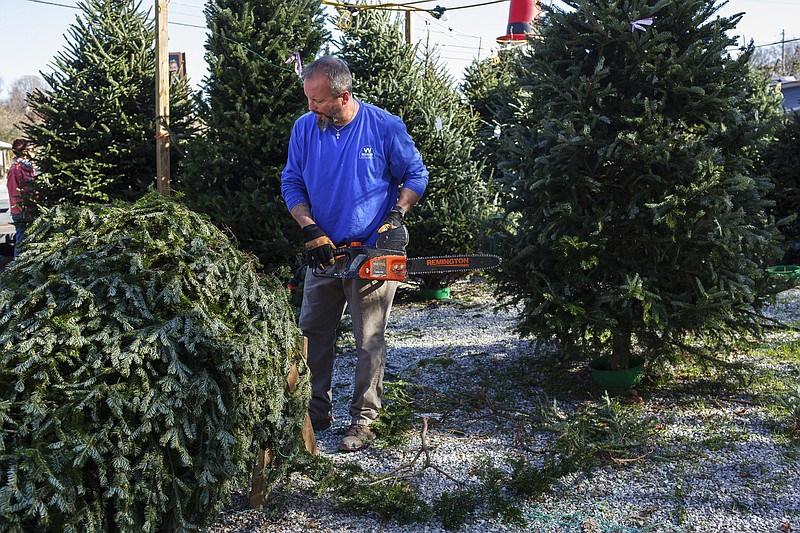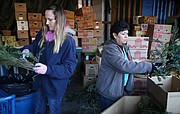While the rest of the country is scrambling to buy the perfect Christmas tree before they're all gone, local sellers said they're not experiencing any signs of a shortage.
Doug Hundley, spokesman for the National Christmas Tree Association, said the reason for the tight market stems from a decline in sales during the Great Recession a decade ago.
"During the following year[s], Christmas tree growers did not have the room - available from normal harvesting - nor the revenue to plant as many trees as they would have, if sales had been better," Hundley said in a statement to the Times Free Press on Monday. "The result, 10 years later, is today's smaller supply. Unfortunately, it is happening at a time when the economy is good and demand is high."
As early as July, forestry organizations warned of an impending Christmas tree shortage. In a report, sustainable forestry company GWD Forestry said the shortage could last into 2025 and pointed to last year's forest fires as one of the causes.
But in Chattanooga, at least, business seems to be running as usual.
John Weaver, owner of Weaver Tree Farms in North Carolina, has set up shop around Thanksgiving under a red-and-white tent on Signal Mountain Road for the past 31 years. For the rest of the year, he lives in West Jefferson, N.C., where he runs the Christmas tree farm - a business that's been in his family since 1967.
Christmas tree tips
› Cut up to one inch off the base of the trunk› Do not cut the trunk at an angle or in a V shape, as it reduces the amount of water it can absorb and makes it difficult to hold the tree in the stand› Use a stand with at least one quart per inch of trunk diameter in water-holding capacity› Don’t whittle the trunk down to fit a stand — outer layers of wood are best at absorbing water› Keep the tree away from sources of heat, such as heater vents, fireplaces and direct sunlight› Use lights that produce low heat› Always inspect lights before placing on the tree› Do not overload electrical circuits› Always turn off the lights when leaving the house or when going to bed› Never burn any part of a Christmas tree in a wood stove or fireplaceSource: weavertreefarms.com
Weaver said his wholesale business at the farm in North Carolina has had several calls from businesses across the country looking to order trees early, but here in Chattanooga, he hasn't noticed a sense of urgency.
He expects to have plenty of trees up until the third week of December, which is when he heads back to North Carolina for Christmas.
But he does think the season might wrap up early this year.
"Instead of people putting it off and dragging it on, I think it might be a lot of earlier purchases," he said, adding he wouldn't be upset to go home early.
On Sunday, a steady flow of people were coming and going as they looked for just the right Christmas tree. Rows and rows of trees in varying heights lined the gravel parking lot, ready to go home with the perfect family.
About 2,000-2,500 trees are sold each season, Weaver said. His busiest days are in the first and second weekends in December.
"It's like a zoo," he said.
Over on the other side of the river, Steve Tipton of Linda's Produce on Ringgold Road, said he hasn't seen any signs of a shortage, either.
For the past 26 years, he's ordered from the same grower just outside of Asheville, N.C., he said. He usually buys about 600 trees, and each one gets sold.
"I've sold trees as late as Christmas Eve day," Tipton said. "Usually we're out by then, but if we have any left, we'll have someone come in and say, 'I've got to have a tree!'"
A shipment of around 520 trees was being unloaded at the East Ridge location Sunday. The trailer was filled with yellow-tagged trees, each packed vertically and wrapped in nets to keep them neat and tidy.
Tipton said they pick which trees they want to buy in July, and the yellow tags are how the growers know those are his trees. The trees are harvested right after Thanksgiving, he said, "so they're freshly cut."
Dan Raulston, owner of Raulston Acres Christmas Tree Farm in Rock Spring, Ga., said he has more trees on his farm than last year, but he said tree growth has been affected by last year's drought and increased demand.
"We have a lot of people coming on the farm now that say, 'This is our first year to get a real [tree]!'" he said.
He said the drought last year likely will be felt for two or three more years when it comes to tree height.
"Right now, we don't have any 9-foot trees in the field, and it's simply because they were cut last year when they were 7-foot," he said. "Eventually, that drought experience will be absorbed down the road."
In addition to his own trees, Raulston orders bigger trees from North Carolina, and he said those growers said they weren't able to supply as many as he'd hoped to order. He said that problem comes from farmers cutting back on the number of planted trees 12-15 years ago, in addition to the drought.
On Weaver's farm, he said they keep anywhere from 350,000-400,000 trees growing. He said for every tree that is cut, two are planted.
It takes about eight to 10 years for a tree to reach the right size for harvesting, but that only includes the time it's been planted in the field, Weaver said. Trees spend about six years in the nursery. In total, an average Christmas tree will be about 14-16 years old by the time it's made it into someone's home.
Now that Great Recession trees are reaching harvesting size, the effects are being felt in the industry. Nationally, the average Christmas tree prices have doubled from $36.50 in 2008 to $74.70 in 2016, according to consumer surveys by the National Christmas Tree Association.
But Weaver and Tipton said their prices have not been affected this year. In fact, they said their prices have remained about the same for years.
"Believe it or not, they're not a whole lot different," Tipton said. "Not like you'd think, anyhow. What we sold then for $49 might be $59 now."
He said most trees will last about a month or more if properly cared for.
"If you keep them watered good and away from heater vents, they'll last five weeks, maybe, something like that," Tipton said.
As for what makes the perfect Christmas tree?
"Beauty is in the eye of the beholder," Weaver said, pointing to different sized trees in the lot. "What you want and what I want are two different things."
His advice is to be mindful about the amount of space available for the tree.
Contact staff writer Rosana Hughes at rhughes@timesfreepress.com or 423-757-6327. Follow her on Twitter @HughesRosana.

